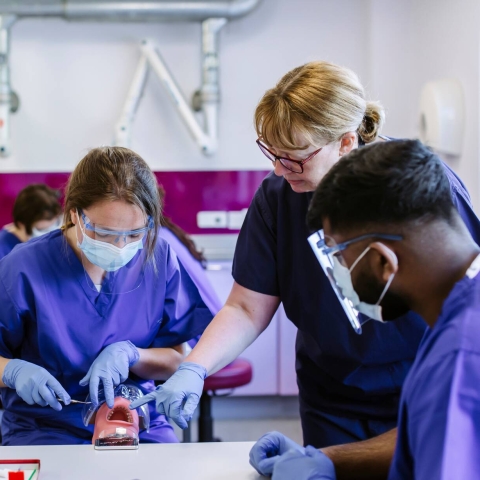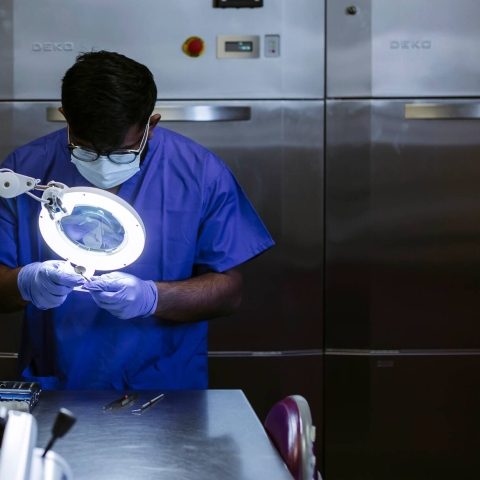

Postgraduate research in dental and oral health
Ready to start your research career? Explore our postgraduate research degrees in dental and oral health
Join our Postgraduate Open Events
From finding out which postgraduate option is right for you, to exploring the perfect course, browse our upcoming webinars and in-person events and book your place today.
If you're interested in taking your existing expertise in Dental and Oral Health into a postgraduate research degree, Portsmouth is the perfect place to do it.
We're looking at how clinicians work with patients from different demographics to promote oral health and prevent disease. We're also addressing the growing demand for more complex dental treatment and maintenance among an ageing population, by helping to both develop new operative and learning tools for dentistry – such as the use of Teledentistry in dental education. We are also investing in new restorative material development through advanced 3D printing techniques and how these behave in the oral environment.
As a postgraduate research degree student with us, you’ll make your own contribution to our pioneering work, and play your own part in turning our research into impact.
Research degrees
Find out about our PhD, MPhil, Professional Doctorate and PhD by Publication opportunities in Dental and Oral Health below, including how to apply, entry requirements and funding your degree. For more detailed information about the application process, visit our How to Apply pages.
Dental & Oral Health PhDs and MPhils
Explore our pre-approved funded and self-funded PhD projects in Dental and Oral Health, or submit your own research idea.
PhD and MPhil projects
Funded
There are currently no funded PhD projects available in this area – for more information on funding your own research project, visit our pages on funding your research degree.
Submit your own idea
If you already have a research idea, find a supervisor whose research interests match yours by searching our Find a PhD Supervisor page. Once you've identified someone suitable, contact them to discuss your idea.
PhD by Publication
A PhD by publication is a postgraduate research degree based on research you've already undertaken and had published (excluding self-publishing) before registering with us.
Eligible research outputs include peer-reviewed academic papers, complete books or chapters in anthologies, and other materials accepted for publication, exhibited or performed. You'll have to submit these materials for examination between 6–12 months after registering with us.
From October 2026, all PhD by Publications will be completed by distance learning. However, there is no expectation that any student applying for a start date before this should be on campus.
For more information, please visit our PhD by Publication page.
Duration, fees and funding
What do my tuition fees cover?
If you're self-funding your PhD, you'll pay tuition fees to the University to cover course and university costs.
Your tuition fees cover:
- The cost of your postgraduate research programme* at the University as well as charges for registration, tuition, supervision, and examinations
- Bespoke training, professional development courses, networking, and research support through The Doctoral College
- Research seminars and workshops (university-wide and faculty-specific)
- A contribution to funding to attend a conference or development activity in your research field
- Tailor-made weekly and monthly events, including weekly, themed experienced researcher-led talks and workshops
- Helping you become part of our thriving research community, including Research and Innovation services where 77% of our research is world leading and internationally excellent in REF 2021
- Your graduation ceremony
- Viva examination and administration costs
- The facilities and equipment you need to complete your studies, such as computer rooms, access to laptops, the Library, and laboratories
- Access to resources including electronic journals, alternative guide to funding, and thousands of hours of educational videos on LinkedIn Learning
- University support services including academic, financial, careers and wellbeing support and personal tutors
- Membership of the Students' Union (giving you the right to vote in elections, join clubs and societies, and get free independent advice)
- Access to software such as Microsoft Office, SPSS and Adobe Creative Suite (this includes Photoshop, InDesign, and Adobe Premiere Pro)
*Please note that some research programmes may come with additional bench fees.
How long will my research degree take?
- MPhil: 2 years full-time, 4 years part-time
- PhD: 3 years full-time, 6 years part-time
- PhD by Publication: 1 year part-time
How much will my degree cost?
PhD and MPhil
UK, Channel Islands and Isle of Man students
- Full-time and full-time distance learning: £5,006 per year (may be subject to annual increase)
- Part-time and part-time distance learning: £2,503 per year (may be subject to annual increase)
EU students
(including EU Scholarship)
- Full-time and full-time distance learning: £5,006 per year (may be subject to annual increase)
- Part-time and part-time distance learning: £2,503 per year (may be subject to annual increase)
International students
- Full-time and full-time distance learning: £19,200 per year (may be subject to annual increase)
- Part-time and part-time distance learning: £9,600 per year (may be subject to annual increase)
PhD by Publication
External candidates: £5,006
Members of staff: £2,000
All fees are subject to annual increase. If you are an EU student starting a programme in 2025/26 please visit this page.
We'll confirm fees for courses starting in 2026 soon.
Bench fees
Some PhD projects may include additional fees – known as bench fees – for equipment and other consumables, and these will be added to your standard tuition fee. Speak to the supervisory team during your interview about any additional fees you may have to pay. Please note, bench fees are not eligible for discounts and are non-refundable.
Funding support
MPhil full-time and part-time courses are eligible for the Government Postgraduate Loan (UK/EU students only).
PhD full-time and part-time courses are eligible for the Government Doctoral Loan (UK/EU students only).
For information on other sources of funding, visit our funding your postgraduate research degree page.
Entry requirements
The entry requirements for a PhD, or MPhil include an upper second class honours degree or equivalent in a relevant subject, or a master’s degree in an appropriate subject. Equivalent professional experience and/or qualifications may be considered. All applicants are subject to interview.
If English is not your first language, you'll need English language proficiency at a minimum of IELTS band 6.5 with no component score below 6.0.
If you don't meet the English language requirements yet, you can achieve the level you need by successfully completing a pre-sessional English programme before you start your course.
Support and facilities
When you join us, you'll be supported by our Doctoral College, alongside your assigned supervisory team, who'll help you get the most from our facilities. The Doctoral College will help you become part of our thriving, collaborative research community, and help grow your skills as a researcher through the Doctoral Development Programme, which offers training, workshops and events.
What can a postgraduate research degree do for my career?
Once you complete your postgraduate research degree, you'll be a highly-skilled researcher with the knowledge and skills to make an impact in many different industries.
Your postgraduate research qualification demonstrates to potential employers that you're an intelligent, capable and motivated person, with provable abilities and experience in critical thinking, problem-solving, project management, communication, leadership and creativity.
Apply
Apply for a research degree in Dental and Oral Health by completing our online form.
February (2026 start)
April (2026 start)
October (2026 start)
Current research
Explore the work we're doing in our areas of research expertise in Dental and Oral Health.
Dental education
We're focusing on the development and evaluation of education for the dental team, and working to develop new operative and learning tools for dentistry.

Dental public health
We undertake research relating to promoting health, preventing disease and how to facilitate access to high quality dental care for all.

Clinical innovation
We're conducting studies that consider and test advanced clinical and diagnostic techniques, efficient models of clinical care, and novel clinical materials.

